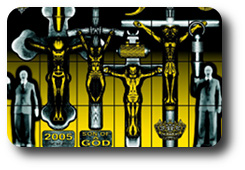Tuesday 13 October, 7.00pm until 9.00pm, Notre Dame University, London
Venue: University of Notre Dame London Centre, 1 Suffolk Street, London SW1 4HG
Tickets: £7.50 (£5 concessions) per person. Tickets are available from the Academy of Ideas website.
 The charge-sheet against religion’s curtailment of artistic freedom is long, and by no means confined to the past. Since the The Satanic Verses controversy 20 years ago, religious campaigners have sought to censor the Jyllands-Posten Mohammed cartoons, Behzti at the Birmingham Rep, Jerry Springer the Opera, The Da Vinci Code, Cosimo Cavallaro’s ‘My Sweet Lord’, Chandra Mohan’s The Beautiful Vexation… and the list goes on. Consequently, religion has become something of a bogeyman to the 21st century arts.
The charge-sheet against religion’s curtailment of artistic freedom is long, and by no means confined to the past. Since the The Satanic Verses controversy 20 years ago, religious campaigners have sought to censor the Jyllands-Posten Mohammed cartoons, Behzti at the Birmingham Rep, Jerry Springer the Opera, The Da Vinci Code, Cosimo Cavallaro’s ‘My Sweet Lord’, Chandra Mohan’s The Beautiful Vexation… and the list goes on. Consequently, religion has become something of a bogeyman to the 21st century arts.
But aren’t secular states as guilty of censoring art as any religion, China’s Cultural Revolution being perhaps the best known example? Moreover, since time immemorial, religion has inspired art. The list of divinely inspired art is a match for any ‘religion-as-censor’ list: the Sistine Chapel, the Mahabharatha, Bernstein’s Chichester Psalms, Dante’s Divine Comedy, Ginsberg’s ‘Kaddish’, Rumi’s poetry and Handel’s Messiah are just the tip of the iceberg. The religious and sacred in art points to something beyond the merely natural or biological in the human condition. For William Blake, the imagination was the ‘human form divine’.
Is there a place for the divine in art in the 21st century? Is religion the enemy or friend of contemporary art? Can we fully enjoy our artistic legacy if we don’t know our religious history? Andrew Motion has called for school children to be taught the bible so they can fully appreciate poets like Milton. But how does multicultural, secular society cope with art that celebrates specific beliefs over others? Can art that celebrates a particular faith still be universal in what it says about humanity? Have we lost faith in art that aims to transcend and transform full stop? And if so, is that the death knell for sacred art? Or is great art today simply embracing the divine in a different way, heralding no one faith in particular, but capturing the spirit of modern life and imagination, from Gormley’s ‘Angel of the North’ to Akram Khan’s ‘Sacred Monsters’?
 | Dolan Cummings associate fellow, Academy of Ideas; author, That Existential Leap: a crime story (forthcoming from Zero Books) |
 | Dr Dennis Doordan professor, School of Architecture and Department of Art, Art History and Design, University of Notre Dame; author, Twentieth Century Architecture |
 | Ruth Gledhill religion correspondent, The Times; journalism tutor, City University |
 | Andrew Haydon commissioning editor, theatre, Culture Wars; co-editor, TheatreVoice.com |
 | Ivan Hewett chief music critic, Daily Telegraph; professor, Royal College of Music; broadcaster; author, Music: healing the rift |
 | George Pitcher journalist; Anglican priest, St Bride's Church, Fleet Street; author A Time to Live: the case against euthanasia and assisted suicide |
 | Professor Ben Quash professor of Christianity and the arts, King's College London; consultant, BBC's 'Religion and Ethics' |
 | Padraig Reidy news editor, Index on Censorship; regular contributor, Guardian's Comment is Free |
| Chair: | |

|
Dr Shirley Dent
communications specialist (currently working with the British Veterinary Association media team); editor, tlfw.co.uk; author, Radical Blake |
The Pope has condemned as
Aislinn Simpson, Telegraph, 28 July 2009Religious art is spiritual, but spiritual art is a much broader and less-defined concept.
Eline van der Vlist, Art Info, 1 April 2009From bookshops to art galleries, free expression is being stymied by the aggressive tactics of a Christian campaign group
Terry Sanderson, Guardian commentisfree, 20 November 2008Censorship is a terrible thing. So thank goodness it never works
Philip Pullman, Guardian, 29 September 2008The Holy See is seeking fresh talent. Could Damien Hirst be the new Michelangelo?
Andrew Johnson, Independent, 8 June 2008